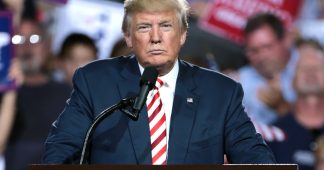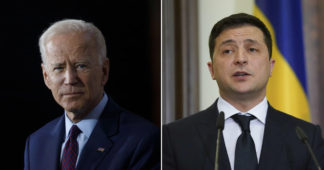Jan 10, 2023
Two major developments can be inferred from the results of the November 8, 2022 mid-term elections in the United States. First, the voters did not punish Joe Biden after his first two years as president as the pre-election polls had predicted they would. Consequently, Donald Trump’s political standing has diminished along with the legitimacy of his leadership role in the Republican Party.
All 435 seats in the House of Representatives were up for election, and Republicans now have control of the lower chamber, though by a narrow margin. Since the end of World War II, the opposition party has usually won at least one of the two legislative bodies in the first mid-term election after a new president takes over. Historically, however, the opposition victory margin is much higher than what the Republicans were able to obtain this time around.
The Non-Existent Red Tide
Despite Biden’s low approval rating (41%) and inflation’s crushing impact on the low-income population, he was not overwhelmingly rejected by the voters. Recurring interest rate hikes throughout 2022 aimed at curbing inflation have discouraged new businesses and local mortgages, but billions of dollars pouring into the United States from Latin America and Europe have strengthened the dollar. Furthermore, with the recent exception of tech companies, U.S. employment has not been negatively affected as it has been in other parts of the world.
Biden took office at the tail end of the Covid pandemic, when widespread vaccine availability helped return things to normal. Still, he had to face ongoing problems resulting from the pandemic. Supply chain interruptions reduced the production of goods precisely when demand, helped along by pandemic-related financial aid to individuals, surged again after long months of paralysis. Those two factors were the main causes of the recently unleashed inflation, accelerated in turn by the war between Russia and Ukraine-NATO.
Among Western countries, the United States is the big winner in that war. While Ukrainians and Russians provide the blood, U.S. oil producers have achieved what their industry lobbies have long sought: stopping operation of the Nord Stream II pipeline so that Russia can’t export natural gas across the Baltic Sea into Germany, and from there distribute it throughout Europe.
During the Trump administration, European companies participating in the pipeline project were sanctioned, causing construction delays and driving up costs. It was finally completed in September of 2021, and was waiting for the operational protocols to be defined when war broke out in February. U.S. companies took advantage of the situation by replacing what would have been Russia-supplied liquid gas with their own, which is produced with environment-degrading technology (fracking) and transported in enormous tankers that are themselves highly contaminating.
The military-industrial complex as a whole has benefited from the war. Its stock shares have risen in value without pause as the Biden administration funnels billions of dollars in military assistance to Ukraine, as have the major nations of Europe.
This was the context in which the U.S. mid-term elections took place.
The Latino Vote and a Possible Trump Rival
The former president personally supported a many Republican candidates in the mid-terms, with mixed results. The press has highlighted a politician who could overtake Trump as the Republican presidential nominee in 2024. He is Ron DeSantis, who was easily re-elected as Florida governor in November after barely winning the governorship in 2018 with Trump’s endorsement.
DeSantis’s 2022 victory over Democrat Charlie Crist by a margin of 60% to 40% was aided by a surprisingly strong showing among Florida’s Latino voters, 57% of which voted Republican, according to various exit polls. A large percentage of Cuban, Venezuelan and Nicaraguan residents, including eligible voters with roots in those countries, reject what they see as Democrats’ less aggressive, even conciliatory, approach to the regimes of those countries. That perception helps explain the sweeping victory obtained by DeSantis, a messianic leader of the far right who’s not all that different from Trump. A key to understanding who DeSantis is can be found in one of this campaign ads in which he declares that on the eighth day, God created a warrior who would take up arms to defend the people. That earned him a nickname from Trump: “Ron DeSanctimonious.”
Assuming that his party would sweep the Democrats, Trump said before the elections that he would soon make a major announcement, which was widely assumed to be his candidacy for the presidency in 2024. He did announce his candidacy, although in a less triumphalist way than originally envisioned.
On Election Day, he sent a message to DeSantis, telling him that he would be sorry if he announced his own run for president. “I would tell you things about him that won’t be very flattering,” he said to a reporter from Fox News Digital. “I know more about him than anybody — other than, perhaps, his wife.” The former president had been saying for months that it would be imprudent for DeSantis to run against him for the Republican nomination. “I would beat him like I beat everyone else,” Trump said.
All of which raises a serious question: How is it conceivable that in the world’s foremost democracy somebody who is under multiple investigations for crimes such as a failed attempt at a coup d’etat on January 6, 2021, trying to overturn the election results in the state of Georgia and elsewhere, illegally removing and hiding in his private home secret government documents, and tax evasion, can play such a major role in the pollical game with enormous popular support?
Trump has managed to convince some 70% of Republicans that the 2020 elections were fraudulent, which lends a certain degree of Third World fragility to the legitimacy of his country’s institutions. In the United States, buying firearms is not much different than buying a pair of shoes, and many of Trump’s supporters are ready to use them if he doesn’t win the presidency in 2024. That fact alone begs an analysis that is not merely political but also psychological, anthropological and theological.
Latin America Between Trump and Biden
The facts make clear that Biden’s foreign policy in the region is less interventionist, probably because his focus has been on the Russia-Ukraine/NATO war and the rivalry with China. In the current scenario of war in Ukraine and a warlike confrontation in the Taiwan Strait, the Latin American region has been on the sidelines, unlike the European nations that have stayed in lockstep with the U.S. national security policies, at enormous cost to their populations.
With the exception of a few countries (Bolivia, Cuba, Nicaragua and Venezuela) that have abstained from condemning the war in the United Nations on the grounds that the text of the declarations did not consider a broad enough context, most Latin American countries condemned Russia’s invasion of Ukraine. Despite an appeal by Ukrainian President Volodomir Zelensky in a videoconference during the 10th OAS Summit in Lima, only Colombia, during the Ivan Duque administration, supported economic sanctions against Russia.
Neither Biden nor Trump has an inclusive or cooperative strategy for dealing with any of the problems burdening our region. The Americas Summit is no longer taken seriously and formerly subservient nations are beginning to assert themselves, as seen in the 9th Summit in Los Angeles last June. Some presidents (of Mexico, Bolivia and Honduras) refused to attend, signaling their opposition to the snubbing of Cuba, Nicaragua and Venezuela by the host United States, and those countries that did attend protested the decision not to invite them, contending that it is precisely in these kinds of forums that problems should be dealt with, not separately from afar, amid political and economic sanctions.
Biden’s Americas Partnership for Economic Prosperity is a laughable proposal similar to Trump’s Growth in the Americas Initiative. The main goal of both is to make the region less receptive to Chinese investment. But neither proposes any coherent justification for that goal, which at any rate does not the exclusive privilege of the United States, nor any other single country, but rather of the democratically elected governments of all the countries.
The fact remains, however, that the Biden administration has not put into practice the kind of overtly interventionist actions seen during the Trump administration. An example of the latter was the Lima Group, under the baton of National Security Adviser John Bolton, created because there were insufficient votes among the OAS member countries to condemn the government of Nicolás Maduro. Elliot Abrams, Trump’s special envoy, was sent to Venezuela, and later acknowledged that he had engaged in coup-inducing actions to destabilized the Maduro regime.
Other examples of interventionism under Trump were Operation Gedeon, organized from Colombia in May of 2019, with the goal of ousting Maduro, the invitation of Venezuelan opposition leader Juan Guaidó to Trump’s 2020 State of the Union address where he received an ovation, and authorizing millions of dollars for Guaidó,who claimed to be Venezuela’s legitimate president, to name his own representatives to 54 nations across the global, as well as international organizations such as the OAS and the Inter-American Development (IADB). Even the Venezuelan opposition has since abandoned Guaidó.
Furthermore, in 2020 Trump imposed Mauricio Claver-Carone, a former Cuban blogger who served as his adviser for Hemispheric Affairs in the National Security Council, as president of the IADB. He charged Iván Duque and Sebastián Piñera with eliminating the South American Union of Nations (UNASUR), which had been going through a crisis caused by political changes among its membership and a failure to name a secretary general, and to replace it with an anodyne organism called the Forum for the Progress and Integration of South America, created in Santiago de Chile in 2019. That same year, the OAS, with Trump’s permission, played an intrusive role in the Bolivian elections, causing an institutional breakdown in that country that left 30 dead and hundreds injured.
In contrast, under Biden, Claver-Carone has left the IADB under a cloud of accusations of inappropriate behavior (raising the salary of a staffer with whom he had a sentimental relationship), the Lima Group is a corpse, and Juan Guaidó is out.
With one exception, Latin American candidates who don’t automatically align with the United States have been consistently winning elections since 2021. Pedro Castillo won in Peru in July of 2021, despite unfounded accusations of fraud that were not backed by the United States or by the OAS, which refused to accept a delegation from the Peruvian opposition. Then came the victories in Honduras of Xiomara Castro of the socialist Partido de Libertad y Refundación, in November of 2021, of leftist leader Gabriel Boric in Chile in December of that same year, of Gustavo Petro of Colombia’s Pacto Histórico in June of 2022 and recently in Brazil of Luiz Inácio Lula da Silva, of the Partido dos Trabalhadores.
The exception has been Ecuador, which has functioned as an effective facilitator of U.S. interference since the election of Lenín Moreno in 2017. Moreno had served as vice president during the presidency of Rafael Correa, but broke with him after taking office to align himself with the United States under Trump. In early 2019, Moreno revoked the asylum that Correa had granted Julian Assange, who had spent the last seven years in Ecuador’s London embassy. Moreno was one of the obsequious leaders that abandoned UNASUR, whose headquarters was in Quito. Bucking the trend, Ecuador’s voters elected another U.S. enabler, Guillermo Lasso, in April of 2021, after the nation’s indigenous movement failed to back the candidate put forth by Correa.
Reduced U.S. interference under Biden, along with the turn to the left throughout most of the region since 2021, create a favorable context for exploring greater cooperation and coordination in some key issues, such as food security, sanitation, energy, new approaches to combat drug trafficking, and climate change, among others.
Biden’s government is more focused on strengthening its ties with Europe and confronting China and the Indo-Pacific, rather than proposing solutions to the problems of migration, drug trafficking, climate change and other issues affecting our region. But a 2024 victory by Trump or DeSantis would be disastrous for those goals, since it would increase pressure on the region to become involved in maintaining U.S. global hegemony.
We remind our readers that publication of articles on our site does not mean that we agree with what is written. Our policy is to publish anything which we consider of interest, so as to assist our readers in forming their opinions. Sometimes we even publish articles with which we totally disagree, since we believe it is important for our readers to be informed on as wide a spectrum of views as possible.











